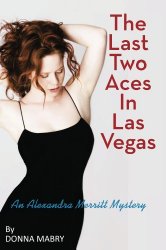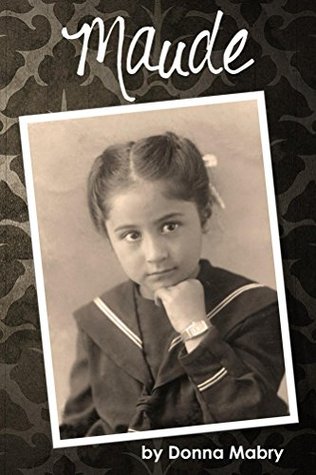IndieReader continues to celebrate Women’s History Month (as if all of what women have accomplished could be fit into a single month!) with an interview with Donna Mabry, a Wall Street Journal bestselling author with more than 18 novels, three screenplays, a stage play, poetry and short stories to her credit.
Donna’s latest book, Maude–which became a #1 bestselling self-published nonfiction book on Amazon–is a deeply personal account of her grandmother’s life in Detroit during the 1900s.
Donna tells IndieReader about her surprising beginnings in the writing world and her thoughts on Women’s History Month.
Maya Fleischmann (MF): Your bio says that you were sixty years old and gearing down for retirement when you received a call that sent you in a completely different direction. Tell us about that call and the path it set you on.
Donna Mabry (DM): I was doing volunteer work at the local theater, acting and making costumes. When my daughter, Melanie, became Director of Entertainment at a major casino in Las Vegas, she had them hire me to come out and work for them. It was in the women’s dressing rooms that I overheard things that I thought would be a great novel, and then I thought, “Why not do it myself?” So, I did. It was so easy, but too long. I had to take out 20,000 words, so I removed one character and used him as the start of book two. I was off and running. Since then, I’ve published at least one book a year.
MF: With regards to your comment about being sixty years old and starting a new career, how do you feel that being a mature writer has shaped your writing and stories?
DM: I can understand more and see much farther than when I was younger because I’m standing on the shoulders of life experience.

DM: When I was working in Vegas I overheard one of the performers talking about a casino owner who she thought was losing his mind. He became the inspiration for Alberto Minnelli in my first book, The Last Two Aces in Las Vegas. I base all my major characters on people I know or celebrities I know about. Alex is really based on my daughter, Melanie.
In the second book in the series, The Las Vegas Desert Flower, Malcolm Butterworth is based on a famous, much tattooed basketball player. No one’s secrets are safe with me.
MF: What inspired you to move from the mystery genre to historical fiction, and ultimately to Maude?
DM: My Baptist sister was tired of the murders I was committing and told me that I should write something more inspirational, so I wrote Jessica. Of course, since it’s basically a western, I still had to kill a few people. I have to give the credit for Maude to Melanie. I used to tell her these stories and one day she told me write the book. It took me ten years of off and on. I put it aside for a while because my mother, Evelyn, became upset when she heard I was writing it, but after she passed, I did one more revision and published it using Amazon’s CreateSpace and Kindle Direct Publishing.
MF: What does Women’s History Month mean to you and how do you hope that Maude will contribute to the spirit of this?
DM: I am so proud of my grandmother. Because of women like her, I can drive a car, own my own home, and vote. Her story covers more than six decades of history from an American woman’s perspective. It’s actually being used in college classes as a textbook. She was always shy and self-effacing, so I hope she approves.
MF: Tell us about your decision to publish independently. What made you go this route and how has it worked out for you?
DM: I had a publisher for my first book and it was a good-news, bad-news situation. They put a very high price on it, made me cut the story to fit their specifications, and they owned it for eight years. They also refused to use the cover I wanted. Can you imagine me being forced to cut ONE-THIRD of Maude? That will never happen with CreateSpace or Kindle Direct Publishing. I am in control of my own product, and if I need assistance along the way they are always there to help. Everything about my experience with Amazon’s CreateSpace and Kindle Direct Publishing, and their team, has been a positive.
MF: You have written in a number of different genres. Do you have a favorite genre?
DM: I’m like a mother–I love the one I’m with right now. Fortunately, I’m able to work on more than one thing at a time, often more than one. It depends on my mood. The mysteries don’t require a lot of research, so when I’m feeling lazy or waiting for a history book to arrive (from Amazon, of course) I work on creative murdering. When I’m feeling mentally charged, I tackle a historical. I’ve also written screenplays, stage plays, and poems.
MF: What project are you working on now?
DM: I am almost finished with the second draft of D’Arcy Curran, a Civil War story that goes back and forth between D’Arcy at home in Manhattan, Kansas, and Detroit, and Lieutenant Jonathan Taylor, (D’Arcy’s sister Suzanne’s fiancé) on the battlefields.
MF: You have had a wealth of diverse careers, including acting and costume design. What would you be doing now if you weren’t writing?
DM: I would probably spend my time painting pictures, making collages, and making furniture. I like that sort of thing.
MF: Do you have a favorite quotation from your books? Who says it and what is the context?
DM: It’s what my grandmother, Maude, said that near the end of her life. She’d lost four of her five children and knew she wouldn’t live much longer: “I think now God gives each one of us a measure of happiness for our lives, and some are allowed more than others. It’s like the ration stamps that were handed out during the war, so much butter, so much sugar, and then no more”.
